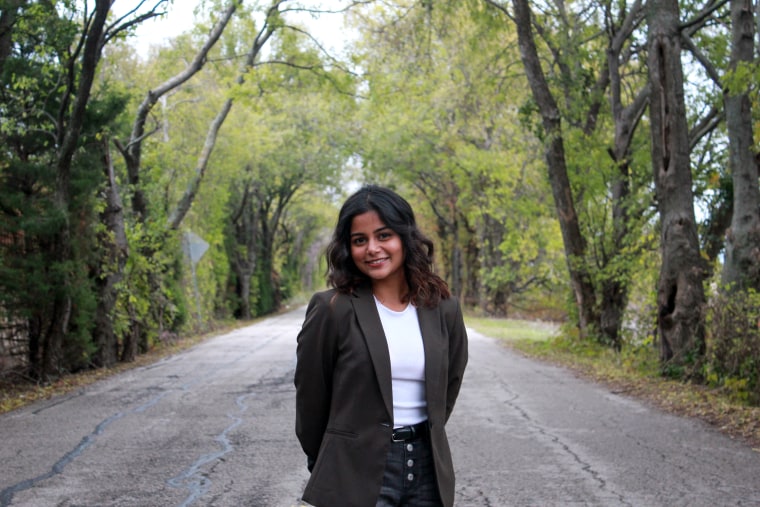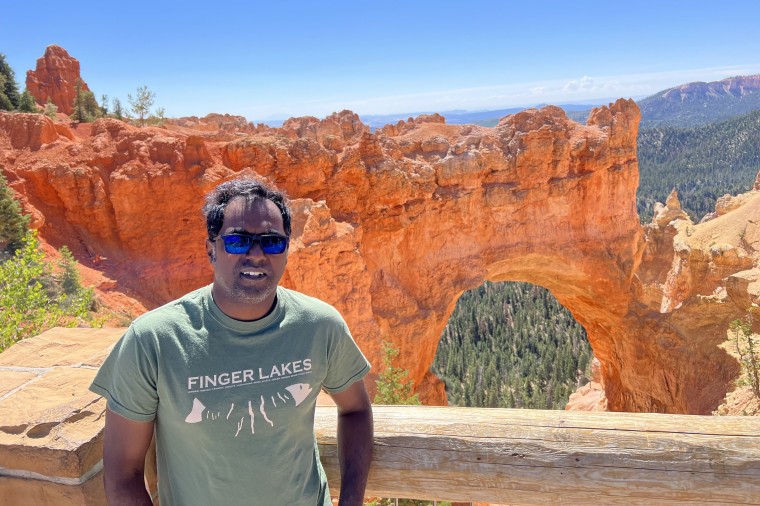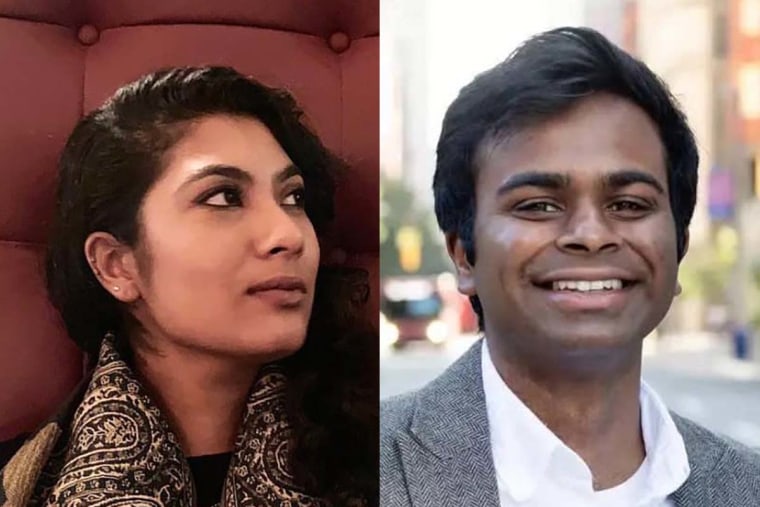After Indian Americans surpassed Chinese Americans as the largest Asian-alone population in the U.S., experts say they’re solidifying themselves as a political force — and a group politicians can’t ignore in 2024. From grassroots activism to voter registration to running for office, Indian Americans are a burgeoning presence in U.S. politics.
“This is a community that’s waking up to the power they have in the electoral space,” said Chintan Patel, executive director of the voter engagement organization Indian American Impact.
Those who identified as “Indian-alone” — or 100% Indian — on the 2020 U.S. Census number 4.4 million, overtaking the “Chinese-alone” population, which was previously the highest. When multiracial Americans are considered, Chinese is still the largest Asian group in the country, but the milestone pointed to how the Indian population has rocketed over the last decade.
In many states and counties where races are tight, winning a sizable portion of the Indian American vote could make the difference for many candidates, Patel said. In states like Arizona, where the number of Indian Americans is bigger than President Joe Biden’s margin of victory in 2020, their turnout could be decisive.
“What’s really important is to not take our communities for granted, not think of them as simply turn-out voters who will show up and vote, as they’ve always done,” Patel said. “But also to consistently talk to them and persuade them and listen to the concerns within the community. Because, again, they make up the margin of victory now.”
One of the most heavily Democratic-leaning groups in the country, at 68%, Indian Americans are beginning to ask tough questions of both parties, he said.
2016, 2018 and 2020 all saw record voter turnouts for Asian Americans, including South Asians. But experts say many are beginning to question Biden’s record on issues like Gaza.
Karthick Ramakrishnan, founder and executive director of AAPI Data, says that Biden’s presidential approval rating has dropped among AAPI communities. For Indian Americans specifically, it now sits at 43%.

But Ramakrishnan says he doubts this dip will mean less Indian voters showing up at the polls or refusing to vote Democratic. He says issues like abortion, racism and discrimination, which are key issues for the demographic, are much more likely to sway their vote.
“Indian Americans are disappointed with Biden,” he said. “But if you look at Biden’s favorability versus Trump’s favorability and unfavorability, it’s unlikely that Trump is going to make a lot of headway among Indian American voters.”
While Indian Americans have flourished in many industries, politics has been an area in which their representation is sorely lacking, Patel said. But he sees the tide changing. Issues of the day are sparking an interest in voters and potential candidates both old and young, immigrant and U.S.-born, he said.
Like other Asian Americans, their top priorities include inflation, immigration and climate change. They’re strong supporters of reproductive rights and gun control, experts said, and they’re unlikely to support a candidate who doesn’t align with them on issues of racism, a report from AAPI Data/AP-Norc showed.
“Our concerns, while they align broadly with the American population and the national discourse, our lived experiences also lead us to places that add particular emphasis on anti-AAPI hate, discrimination and what we need to do as a nation to fight that — particularly with the rise of Islamophobia right now,” Patel said.
What two first-time SA voters think
Kirti Moteka, 20, a student at the University of Texas at Austin, says that, as a young adult voting in her first presidential election, she’s formed some clear thoughts on what’s driving her to the polls.
“The main issues that are most important to me, both as a student in Texas and also a South Asian and an immigrant daughter, would definitely be reproductive rights,” she said. “I want to be able to know, decisively, where I have the freedom to choose what I want to do with my body and where I don’t, especially because it’s so up in the air.”
Post-Covid, she says access to health care is a major priority for her, and so are educational equity and student loans. She also said that, though there is a large South Asian population in Texas, she hopes to see more people in her community register to vote and get involved.
“I’m sure a lot of immigrants are afraid at times to publicly express their opinion or to go out and vote, or they think their vote doesn’t matter,” she said. “I’d love to see how that could be changed.”

For Sri Vedachalam, 40, this November will also be his first presidential election as an eligible voter. Vedachalam immigrated to the U.S. in 2005, and though he’s always closely followed U.S. politics, he only became a citizen in 2021.
The Virginia resident says he was deeply disappointed with Donald Trump’s handling of Covid, as well as his demeanor during the Jan. 6 Capitol riot. He’s leaning toward voting for Biden, who he says has worked to grow the middle class, mitigate inflation and bring jobs back.
But one major stain on Biden’s presidency for Vedachalam is his handling of Israel’s war in Gaza.
“I think the U.S. has a lot of leverage to stop the ongoing war in Gaza, but we are failing to do so,” he said. “The daily casualties and the relentless bombing is hard to see.”
Gaza is igniting young South Asian voters
Experts say Gaza is a major issue that’s been on the minds of South Asians and other Asian Americans this election cycle. In a survey from March, two thirds of AAPI adults said they disapproved of Biden’s handling of the war.
Among young voters, this is even more pronounced, with the same report revealing 77% of AAPIs from the ages of 18 to 29 disapprove of how the president has handled things.
Antony Gnalian, 30, who is an Indian American from Pennsylvania, voted for Biden in 2020 and has voted Democratic since he was eligible to vote. This year, he says he won’t be doing that.
“Donald Trump is just not even someone I want to even consider as a person for that seat in office, after the insurrection and all of the blatant Islamophobic policies,” Gnalian said. “But I’m even more disappointed in the Biden administration. Where my disappointment lies is obviously the situation in Gaza.”
Gnalian describes himself as a single-issue voter this cycle, saying his support for candidates depends on if they support a permanent cease-fire. He plans to vote uncommitted in the primary, and either vote Green Party or write-in for president.
“The Biden administration continues to provide political cover, they continue to present money over, they continue to send weapons over, for Israel to continue to inflict harm on innocent civilians,” he said. “So I’ve just found that lack of human rights to be really appalling.”
Sumer Shaikh, 30, who is Indian American and Muslim, says she’s grappling with the election as she’s watching Islamophobia rise in the U.S. She’s always seen a Democrat in the White House as a positive thing, she said, but this year, she feels Muslim Americans are going unheard.
“All this bad stuff is happening right now with a Democratic president,” she said. “What is going to be different come November if our leaders really just don’t listen to voters and the communities that put them in office in the first place, which is very true of President Biden.”
One voter pushing the Trump-Modi connection in her canvassing
New Jersey Republican voter Priti Pandya-Patel, 54, says one reason she plans on voting for Trump is his friendship with Indian Prime Minister Narendra Modi and how it has strengthened the relationship between the U.S. and India.
“He is so proud of India and he is so proud of the Indian community,” she said. “I feel like we were so much better off when he was president.”
Patel leads the South Asian Coalition of the state’s Republican Party, and she says she’s traveled all over New Jersey trying to bring more Indian Americans to the polls. She’s disappointed by Biden for many reasons, she said, including that she feels inflation is out of control. She says homeless people in neighboring cities aren’t getting the resources they need, and she worries about undocumented immigrants getting them instead.
“The cost of living has gone up triple, everything is up, but the salaries aren’t there,” she said.
As a health care consultant, she says she also sees these shifts in the medical field. Underfunded hospitals, poor quality of care and rampant drug addiction all concern her.
“Hospitals are not making money, physicians are not making money,” she said “Health care providers, facilities, we’re not able to take care of patients the way that we need to.”
Sikh Americans engaging, running for office
Kavneet Singh, acting executive director of the Sikh American Legal Defense and Education Fund, says he sees concerns in his community on issues ranging from AI to voting rights to religious profiling.
Many Sikh Americans work in fields that aren’t normally associated with the Indian American diaspora. Their long history in the U.S. includes Sikh railroad workers, truck drivers and small-business owners. Singh says they’re concerned about getting fair minimum wages, gas prices and the automation of their labor like self-driving cars.
The community is taking these matters into their own hands by running for office, he said.
“I think you’ve seen this generation realize the responsibility that they have to give back through public service as well as for us to begin to really take leadership in shaping the policies of the states or localities that we live in,” he said.
The rise of the South Asian American candidate
Over the last few years, Patel says he’s noticed an explosion in South Asian Americans launching campaigns for office. Last year saw a historic number of Indian Americans serving in Congress. They’re emerging at all election levels, he said, from City Council to state office to presidential.
“The candidates reflect their communities,” he said. “The shared South Asian values really do come through. These are candidates who care about giving back to their communities. They care about a strong economy, strong education, climate and safety.”
Community members are divided on the most prominent Indian American in public office, Vice President Kamala Harris, whose approval rating among Indian voters dropped from 62% to 56% from 2022 to 2023. But Patel says there’s no doubt her presence on the national stage has propelled people to put forth their own campaigns.
“That really thrust into a national scene that South Asians can be involved in politics and can be successful in politics at such a high level,” Patel said. “I think that really did inspire a lot of South Asian volunteers and activists; folks in the community who had been engaged, but never really imagined themselves on the ballot.”
The two most prominent Indian American candidates this year — Nikki Haley and Vivek Ramaswamy — didn’t make much of an impression on the South Asian community. But experts said it proves that, while representation can drive engagement, voters want someone who aligns with their values. For Indian Americans, those values tend to be progressive.
“Our community knows what they want,” Patel said.
But 2024 means fresh faces in the arena, and the new candidates range from young, second-generation Americans — like 24-year-old Ashwin Ramaswami who is running for state Senate in Georgia — to immigrants like Anil Kumar, who worked as a doctor for 30 years and is now running for U.S. Congress in Michigan.
“They really are a diverse subsection of the entire South Asian diaspora,” Patel said. “They are candidates who are well ingrained in their communities and responsive to the needs of their communities as well.”
For more from NBC Asian America, sign up for our weekly newsletter.

